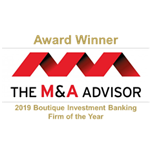In order to successfully sell anything, you’ve got to get into the mind of the consumer. If your business sells anything — whether it’s products or services — you’re likely an old hat at this.
When it’s time to sell your business, you’ll need to get into the mind of the consumer again, although this time, your consumer will be another company seeking to buy your business. Marketing your business properly will make an enormous difference in being able to find the right buyer and usher in a successful deal. That’s why it’s important to understand the difference between financial buyers and strategic buyers.
Financial Buyers and Strategic Buyers — What’s the Difference?
What Is a Financial Buyer?
A financial buyer is going to be a professional buyer of businesses — typically a company like a private equity firm. Their goal is to purchase businesses, improve them, and sell them over a five-to-seven-year horizon to get a return on their investment from that sale.
What Is a Strategic Buyer?
Meanwhile, a strategic buyer is typically a larger company that’s in your industry or a complimentary one. While they buy businesses as part of their growth strategy, purchasing companies may not be the main thing they do. Key strategic acquisitions can allow them to accelerate their growth and significantly enhance shareholder value over the long haul.
A Financial Buyer’s Objectives
When a financial buyer looks at your company, they may be looking at it as a standalone company. They will analyze every aspect of it to see where your company is currently growing and how they can improve things to grow it even further. A financial buyer will dig deep with due diligence to confirm the numbers and ensure that the financials are correct, as well as, review other risk areas such as potential environmental problems or legal issues. Their goal is to buy businesses, grow them, and then sell them, usually in five to seven years.
A Strategic Buyer’s Objectives
A strategic buyer looks at your company through an entirely different lens. They’re looking at synergies. What does your company have that their company currently lacks? Are there cross-selling opportunities? Does your product add to their company’s portfolio? They aren’t as interested in back-office infrastructure because they already have this in place in their own company.
Because a strategic buyer is looking at specific parts of your company that may be valuable to them, they may also be looking at ways to cut costs in areas where there are duplicate processes between your back offices and their own. This could mean rolling some of your processes into theirs, or it could mean cutting out certain processes or departments altogether. These cost savings can result in their being able to offer you a higher price for the business.
Determine Goals to Fine-Tune Marketing
Keeping all of this in mind, it’s important to determine two sets of goals before putting together a marketing strategy to sell your company: what are your objectives and how do you find a buyer that aligns with those objectives?
First, consider your goals as the business owner. Are you looking to sell a percentage of the business but retain control or stay involved? If so, you’re unlikely to find competitors or suppliers who are interested in this type of investing. Instead, seek out a financial buyer that aligns with your vision and can help you grow the business.
If you’d like to sell outright, you need to consider what type of legacy you’d like to leave. If you’re hoping to sell your company and keep it intact with most employees still aboard, a financial buyer’s strategies may more closely align with yours. If you’re simply hoping to make the most money off of the deal, a strategic buyer may be able to offer a higher price.
Finally, you must develop a marketing plan that targets the objectives of the kind of buyer you’d like to find. That’s where MelCap Partners excels. We understand what different types of buyers are seeking and we know how to market your company to appeal to them. Selling your company is about more than simply negotiating the proper price; it’s also about making sure everyone’s needs are satisfied, from demonstrating the potential for growth to ensuring a legacy that will live on long after the deal is closed.















